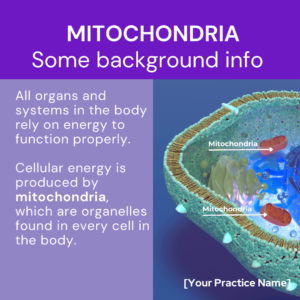
If you think back to high school biology, you probably recall that the mitochondria are the “powerhouses of the cell.” Mitochondria are organelles found inside all our cells—except red blood cells—and are responsible for generating most of our cellular energy supply. Each of our cells can have hundreds to thousands of mitochondria in them, depending on the energetic needs of the cell. There are more mitochondria in the energy-demanding cells of the heart, brain, liver and immune system. Just like your cell phone needs to be adequately charged to work and run its apps, your cells need healthy mitochondria to carry out all their various functions.
How Mitochondria Produce Energy

Energy is needed to drive all biologic activity, and mitochondria generate this energy through a process called oxidative phosphorylation. During this process, electrons are transported through a series of complexes, generating a proton gradient that drives the synthesis of ATP, which serves as the primary energy currency of the cell. This process requires adequate oxygen and is essential for cellular metabolism. When energy production decreases, cellular function is impaired. This can lead to common signs of mitochondrial dysfunction, such as:
- fatigue
- delayed healing
- frequent infections.
What Is Mitochondrial Dysfunction?
Mitochondrial dysfunction can be caused by many factors, including:
- Poor dietary and lifestyle habits
- Environmental toxins
- Infections
- Certain medications
These factors can damage mitochondrial DNA and proteins, leading to a decline in function and energy production. In the process of energy production, our mitochondria produce free radicals and many of the key antioxidants that quench these free radicals. When mitochondria are damaged, they may not be able to meet the antioxidant demands of the cell, which can increase oxidative stress burden.
Conditions Associated with Mitochondrial Dysfunction
Mitochondrial dysfunction can manifest as a wide range of diseases, including:
- Chronic fatigue syndrome
- Neurodegenerative disorders (ie Alzheimer’s & Parkinson’s disease)
- Neuropathic pain
- Migraines
- Metabolic diseases
In neurodegenerative diseases, mitochondrial dysfunction can contribute to the accumulation of toxic proteins due to oxidative stress, leading to neuronal death. Furthermore, metabolic diseases, such as diabetes and obesity, are also associated with mitochondrial dysfunction because impaired mitochondrial function can lead to insulin resistance and metabolic dysfunction.
How to Support Your Mitochondria
Supporting mitochondrial function is crucial to maintaining overall health and preventing disease. You can prevent mitochondrial damage by avoiding and removing exposure to environmental toxins, treating chronic infections, and minimizing the use of certain medications. Strategies to support mitochondrial function also include:
- Regular exercise
- Adequate sleep
- Intermittent fasting
- A healthy diet rich in antioxidants
- Nutraceutical supplements, such as coenzyme Q10 (CoQ10), acetyl-L-carnitine, NAC and alpha-lipoic acid, can all help improve mitochondrial function.
The Bottom Line
In summary, mitochondria play a critical role in overall health and disease. They produce most of your body’s energy while dealing with the bulk of your free radical burden. Mitochondrial dysfunction has been associated with a wide range of diseases, and it can be caused by poor lifestyle factors or other issues, such as infections, environmental toxins and medication side effects.
Let’s Get Started If you’re ready to take control of your health, let our team at Webster Pharmacy help. Schedule your complimentary discovery call today to find out how we can provide you with key nutritional and lifestyle support to optimize mitochondrial function.
